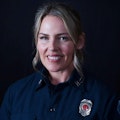Fire Officers, Make It Safe for Members to Challenge You
Gross. Something about the imperative that was noted originally on the sign that’s shown in the photograph—“Never but never”—grinds my gears.
The sign was shown to me by the acting battalion chief, a bright, blustery, 25-year-old captain whose confidence and prior experience earned him acting rights fairly early in his career. Both of our stomachs turned as we discussed officers who have this exact attitude, who condescendingly berated us for daring to question their authority.
I believe that the beauty of the acting battalion chief being close to the new generation’s age is that he can see, and many times share, the perspective of younger firefighters.
Times are changing. We no longer are required to submit to an authoritarian, abusive relationship with an employer. People of all ages recognize their worth and no longer choose cultures that are inspired by this kind of leadership. They literally just leave.
Please, challenge me
The day that the acting BC showed me the sign, he was too scared to modify or discard it himself, so I stepped up and improved the wording. I struck a line through “Never but never” and wrote in “Always.” Now, don’t argue with me when a window is blowing dragon tongues on a two-story residential with exposures and I call for a 5-inch supply, two preconnects and three ladders, but let’s absolutely discuss the decision that I made afterward. We all will learn a thing or two, so, please, challenge me, but do it respectfully, tactfully, at the right time and with data.
I believe that the biggest obstacle that officers face is that they forget how much power that they carry and that their words can cause harm without ever realizing it.
I’m reminded of the power of my words when I get a warm, fuzzy “You’re the reason I joined the fire service” or “Do you remember [this circumstance]? It really affected me.” Sometimes I do, sometimes I don’t. I always feel like an a-hole if I don’t remember the instance or the person, but then the sobering reality sets in that if my words can hold that much power to help, they also probably caused damage. Worse, people aren’t going to tell me about those times, for several reasons. Do they actually believe that I’ll apologize? Unlikely. “If she believed those things then, she probably believes them now.” Further, an apology would show vulnerability, which is the least desirable trait for someone who a member believes might hurt them again.
Which brings me back to the acting BC.
Trust and respect
I have a theory: If only for a sense of self-preservation, officers should consider the repercussions of their actions should a member become their supervisor someday. I got to be this guy’s captain when we were both on another department, then his battalion chief when he promoted to driver. I went over to a neighboring department as a captain, and when he moved over some time later, because we had practice providing each other with feedback, our friendship and officer skills only improved. Now, every once in a while, I get to play captain while he acts as BC, and we absolutely know that we have each other’s back in the swapped roles.
It’s human nature to want to retaliate when we feel wronged, and either he’s really good at hiding it or I managed to make him feel respected as a firefighter.
In fact, that’s one of my favorite questions when I first get to know a new crew member: What makes you feel respected? That usually solicits a blank stare. OK, then, what makes you feel disrespected? Easy. They start to list things: interrupting me, asking for advice and not implementing it, not looking me in the eye, etc.
If I can avoid stepping in poop, I will.
In studying for the BC test, I had the distinct pleasure of reading “The Fire Chief’s Handbook” front to back multiple times. I long ago forgot the minimum percentage of hallways that are recommended for office space and screen angle recommendations for reducing eye fatigue, but I never will forget the two things that the book notes that one must have as a leader—trust and respect—and you must give each of those things to get each of those things. It’s so true. People who verbally demand respect because “I’m your elder” or “I’m your officer” or “I’m your chief” still stick in my mind as absolute clowns.
In short, I don’t recommend that we go around constantly challenging authority just to make waves, but if you supervise in any way, you gain so much by letting people know that you want them to challenge you when they believe that you’re wrong. If you make it safe for them and don’t take it personally, you gain both their respect and trust in the process.
About the Author

Joy Beth Cottle
Joy Beth Cottle works as a captain on Ladder 12 at the University Fire Department in Fairbanks, AK. She holds degrees in fire science, EMS and biology. During her 25 years in the fire service, Cottle served as an academy instructor, chaired an operations committee, and implemented a novel and efficacious hose load in two departments that’s called the “Bundles of Joy.”
